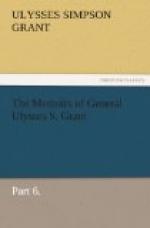Another great advantage resulting from this march, and which was calculated to hasten the end, was the fact that the great storehouse of Georgia was entirely cut off from the Confederate armies. As the troops advanced north from Savannah, the destruction of the railroads in South Carolina and the southern part of North Carolina, further cut off their resources and left the armies still in Virginia and North Carolina dependent for supplies upon a very small area of country, already very much exhausted of food and forage.
In due time the two armies, one from Burkesville Junction and the other from the neighborhood of Raleigh, North Carolina, arrived and went into camp near the Capital, as directed. The troops were hardy, being inured to fatigue, and they appeared in their respective camps as ready and fit for duty as they had ever been in their lives. I doubt whether an equal body of men of any nation, take them man for man, officer for officer, was ever gotten together that would have proved their equal in a great battle.
The armies of Europe are machines; the men are brave and the officers capable; but the majority of the soldiers in most of the nations of Europe are taken from a class of people who are not very intelligent and who have very little interest in the contest in which they are called upon to take part. Our armies were composed of men who were able to read, men who knew what they were fighting for, and could not be induced to serve as soldiers, except in an emergency when the safety of the nation was involved, and so necessarily must have been more than equal to men who fought merely because they were brave and because they were thoroughly drilled and inured to hardships.
There was nothing of particular importance occurred during the time these troops were in camp before starting North.
I remember one little incident which I will relate as an anecdote characteristic of Mr. Lincoln. It occurred a day after I reached Washington, and about the time General Meade reached Burkesville with the army. Governor Smith of Virginia had left Richmond with the Confederate States government, and had gone to Danville. Supposing I was necessarily with the army at Burkesville, he addressed a letter to me there informing me that, as governor of the Commonwealth of the State of Virginia, he had temporarily removed the State capital from Richmond to Danville, and asking if he would be permitted to perform the functions of his office there without molestation by the Federal authorities. I give this letter only in substance. He also inquired of me whether in case he was not allowed to perform the duties of his office, he with a few others might not be permitted to leave the country and go abroad without interference. General Meade being informed that a flag of truce was outside his pickets with a letter to me, at once sent out and had the letter brought in without informing the officer who brought it that I was not present.




